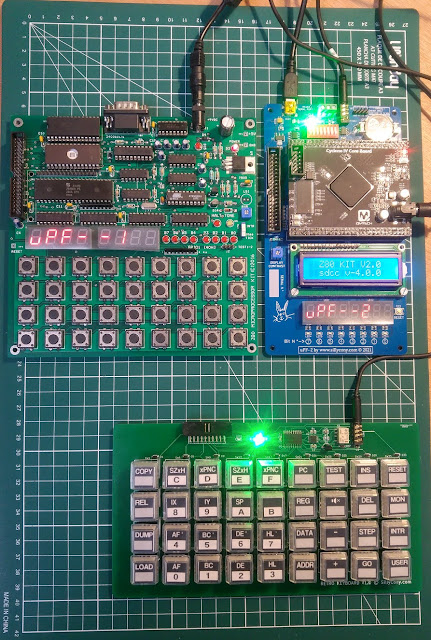Some improvements to the device's I/O circuit board. I also added a precision clock. I'm thinking of modifying the main clock program to use this precision clock.
mardi 14 novembre 2023
mardi 7 novembre 2023
Doing retro-computing is so much more fun!
In 2022 one of my projects consisted of placing a Micro-Professor clone entirely in an FPGA.
For this project, I created an external mechanical keyboard. Because the original membrane keyboard did not seem at all effective for working intensively with the machine. I know something about it, I learned the Z80 assembler on the 1P version in 1987. Memories...
The keyboard, along with Wichit Sirichote's version of the mPF1 and my FPGA version.
After publishing information on my FPGA version on the network, and after receiving some comments, especially about the keyboard, I decided to build a new version of it. This time with a processor that is easier to handle, a RISC-V in this case.
This is what it should look like:
This new keyboard will not be dedicated to a particular hardware type. It will provide its data in standard serial form but in RS485. This is to allow a certain immunity to noise as well as possible positioning quite far from the device to which it will be connected.
Another thought on the Microprofessor: When I had made my version, and knowing that I implemented a USB/serial link allowing the program to be loaded at high speed, I quickly realized that I was not using the keyboard to do the development, it was much more practical on my PC with the SDCC 'C' compiler, but I used it more to interact with the program that I had loaded into the system.
Considering that it is entirely possible to write parts of code in Z80 assembly inside a 'C' program, I tell myself that it is much more relevant now to work in this way since this also allows you to become familiar with the 'C' language...
jeudi 2 novembre 2023
From the beginning, I hated the midi hardware infrastructure (II)
And first of all, the typology of the pseudo MIDI network.What a horror this thing is...





